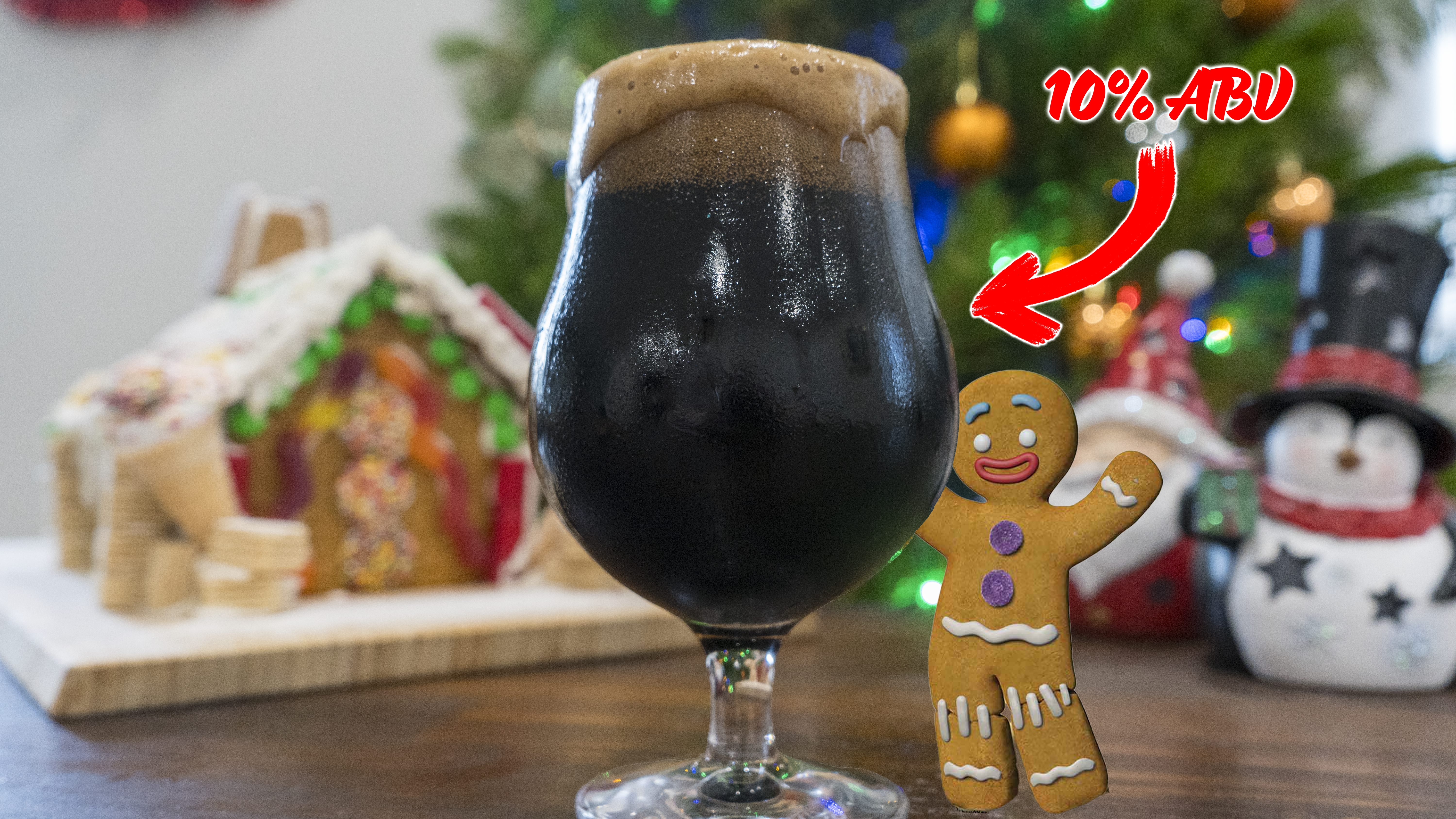Imperial Christmas Gingerbread Stout

So... What is it?
Imperial Stouts, originating in 18th-century England, are robust beers known for their intense flavors and high alcohol content. Inspired by a desire for a stronger stout, these brews have a deep history tied to the Russian imperial court. With a dark, rich appearance and opulent malt profiles, Imperial Stouts offer a complex taste of chocolate, coffee, dark fruit, and caramel. Boasting an alcohol content surpassing 8% ABV, these ales are revered for their indulgent sipping experience.
What is ours like?
So what better way to get silly for the silly season than with Christmas in a glass! This 10% Imperial Gingerbread Christmas Stout is creamy with a decent heft of body considering its impressive abv! The bitterness definitely sits on the lower side at 32 IBU’s and feels even lower than that due to the high gravity and ABV of the beer (next time I make this id bump the IBU’s up to 50-60). The malt character comes bounding through with bready biscuit, strong espresso, a touch of burnt coffee and sweet caramel toffee notes infused with a touch of sticky date pudding and plums! But the true star of the show is the big ginger note that cuts through the sweetness of the beer, tasting a little more like fresh ginger than gingerbread, but perfectly in balance with the bouquet of spices from the cinnamon, allspice and nutmeg. Don't leave too many of these out for Santa or he may not be able to drive his sleigh!
Batch Size & Stats
- 41.1L / 10.85 gal finished beer
- 47.9L (12.65 gal) wort
- Starting gravity – 1.097 (approx likely a bit higher)
- Final gravity 1.022
- ABV – 10% (incl. Vodka addition and measuring bias)
- IBU - 32
- Mash Efficiency 81%
- Brewhouse Efficiency 73%
What ingredients?
Water
With sparging
- 90 minutes, 60L (15.85 gal) strike water 69°C (156.2°F) mash
- 16L (4.2 gal) sparge water at 78°C (172°F)
Without sparging
- 90 minutes, 70L (18.5 gal) strike water 69°C (156.2°F) mash
Water Chemistry (Salts) - (optional)
Mash water
- Calcium Chloride (CaCl2) - 6.1g (0.22 oz)
- Epsom Salt (MgSO4) - 4.9g (0.1.7 oz)
- Slaked Lime (Ca(OH)2) - 3g (0.1 oz)
Sparge water
- Calcium Chloride (CaCl2) - 1.63g (0.057 oz)
- Epsom Salt (MgSO4) - 1.31g (0.046 oz)
- Slaked Lime (Ca(OH)2) - 0.8g (0.028 oz)
- Phosphoric Acid (85%) – 2.2ml (0.0744 oz)
Malts
Total Grain Bill 20.12kg (44.35 lb) + 1.7kg (3.75 lb) rice hulls
Total Fermentables - 21.12kg (46.6 lb)
- Pale Malt – 10.07kg (22.2 lb) - 50.1%
- Dark Munich - 3.01kg (6.63 lb) - 15%
- Rolled Oats - 1.61kg (3.55 lb) - 8%
- Wheat malt – 1.61kg (3.55 lb) - 8%
- Dark Chocolate malt 1.41kg (3.1 lb) - 7%
- Medium Crystal Malt - 1.41kg (3.1 lb) - 7%
- Roasted Barley - 1kg (2.2 lb) - 5%
- Rice Hulls – 1.7kg (3.75 lb)
Adjuncts
- Extra Dark Belgium Candi Syrup - 1kg (2.2 lb)
Extra Flavouring Additions
For these additions split all ingredients in half, and in 2 separate jars soak the spices to make a tincture, ideally to soak for 5 days before brewday
Use half the tincture after flameout on brewday, use the other half in the fermenter near final gravity (id recommend straining out the spices for the fermenter addition)
- 400 ml Vodka (40% abv)
- Ginger Root (dry and kibbled) - 120g
- All Spice (bought whole then roughly crushed) - 16 berries
- Cinnamon stick (bought whole then roughly crushed) - 2 sticks
- Nutmeg (bought whole then roughly crushed) - 2 tsp
- Vanilla Beans (whole then cut in half and seeds scraped out) - 4 beans
- Cloves (bought whole then roughly crushed) - 4 cloves
Hops & whirlfloc tablets
Northern Brewer
- 52.7g (1.86 oz) - 90 minutes left in the boil
- 50g (1.76 oz) 15 minutes left in the boil
Fuggles
- 50g (1.76 oz) 15 minutes left in the boil
Whirlfloc
- 1.5g (0.052 oz) / 2 tablets – 15 minutes left in the boil
Yeast options & fermentation temperatures
- Lalbrew Nottingham Ale yeast – ferment at 20°C (68°F) 23g (0.81 oz) / (2 packets)
- US-05 – ferment at 20°C (68°F) 23g (0.81 oz) / (2 packets)
- AUS-05 – ferment at 20°C (68°F) 23g (0.81 oz) / (2 packets)
- S-04 – ferment at 18°C (64.4°F) 22g (0.81 oz) / (2 packets)
Step by step process
Step 0 - Prep spices! (pre brew-day step)
For these additions, split all ingredients in half, and lightly crush whole ingredients with a mortar and pestle, and slice the vanilla beans in half and scrape out the insides to help the flavour be released.
Then place all ingredients evenly into 2 separate jars with the vodka to make a tincture, ideally to soak for 5 days before brewday
Use half the tincture after flameout on brewday, use the other half in the fermenter near final gravity (id recommend straining out the spices for the fermenter addition)
Step 1 – Milling
- Mill grains to medium crush (set mill rollers to a gap of approx. 1.00mm / 0.039 inches (credit card width)
- Just keep in mind roller gap settings are not universal so as you brew more batches you will find the ideal crush size for your setup
- Alternatively if you don’t have a grain mill you can order your grains crushed from most homebrew stores, both online and in person
Step 2 – Mashing
- Mash for 90 minutes at 69°C (156.2°F)
- Set your strike water to a few degrees above the target mash temperature
- ensure you mix in the grains thoroughly with a mash paddle to prevent dough balls from forming (big spoons, spatulas or whisks will also work)
- its easier to mash the grains and prevent dough balls if you add a little grain at a time, mix, add more grain, and repeat until all the grains are mixed
- if you don’t have a mash tun with heating then ensure after you have finished mixing the grains in to insulate your mash tun (thick neoprene or heavy blankets both work well)
Step 3 (optional) – Sparging
- if your setup has the capability to sparge then do so with 16L (4.2 gal) sparge water at 78°C (172°F)
- if you are not sparging and using a BIAB (brew in a bag) method then remove grains from mash tun and twist and squeeze the bag to get as much liquid out of the grains as possible
- as you start sparging (or straining your BIAB bag) begin raising the temperature of your wort to a boil
Step 4 – Boiling
- (Optional) - for this beer we wanted to bump up the starting gravity, so we boiled the wort for an extra half hour BEFORE we added our 90min bittering hops when the “real” boil began!
- At the beginning of the boil add your belgian Candi Syrup
- once your wort begins to boil start a timer for a 90-minute boil and add your bittering hops, 52.7g (1.86 oz) of Northern Brewer
- at 15 minutes left in the boil add 2 whirlfloc tablets (OR granulated whirlfloc 1.5g (0.053 oz)) and 50g (1.76 oz) each of Northern Brewer & Fuggles
Step 5 – Whirlpooling / cooling
- once wort has been boiling for 60 minutes in total turn off your heat source and begin chilling wort down to yeast pitching temperature
- Right after flameout strain out the spices from 1 tincture jar and add it to the boil kettle, then add the tincture liquid directly to the fermenter
- once you’ve reached yeast pitching temperature take an original gravity reading of your wort
Step 6 – Yeast Pitching
- It is best to make a yeast starter before beginning your brew day (ideally 1 day before) to ensure your yeast are as active and healthy as possible before pitching, but not completely necessary – you could also just rehydrate yeast 30 minutes before pitching.
- Wort Aeration (Optional) if you have a paint mixer give your wort a quick blitz before pitching yeast to help add more dissolved oxygen into the wort to help the yeast have a healthier kick start into fermentation
- Now add your tincture of Vanilla extract! (or you can wait till end of fermentation if you prefer)
- Pitch yeast in wort a degree or two higher than the target fermentation temperature to help yeast take off more aggressively
- To make a yeast starter you can use either:
- DME (dry malt extract) at a ratio of approx. 100g per 1L water (3.5 oz per 33 fluid ounces) for gravity of approx. 1.040
- some unfermented wort kept cold and sanitary from a previous brew day
- 70g of table sugar per 1L water (2.5 oz per 33 fluid ounces) – however, it is best to use malt sugar (wort / DME) whenever possible to reduce the chance of shocking the yeast with a different food source from starter to wort pitching
- To rehydrate yeast
- Add yeast to approx. 10 times as much room temperature water as the weight of the yeast e.g. 10g yeast in 100 ml water (0.35 oz yeast in 3.5 fluid ounces water)
Step 7 – Fermentation
- Allow yeast to ferment over the next two weeks (approx.)
- If you have a temperature-controlled system keep the fermenter temperature to the recommended fermentation temperature for each yeast strain (stated in the yeast ingredients section above)
- Monitor the fermentation activity over the first 7-10 days by the bubbling of the blow-off tube/airlock of your fermenter, as the bubbling slows down (roughly around day 10-12) take a gravity reading. When the gravity reaches around 1.024 raise the temperature of your fermenter by 1-2 degrees for 2 days for a diacetyl rest (if you don’t have temperature control don’t worry about this step, it's not the end of the world!)
- At this point strain out your last jar of tincture and add the LIQUID only to your fermenter
- On day 2 of the diacetyl rest (once gravity reaches roughly 1.018) & gravity is the same 3 days in a row move onto cold crashing! (If you can’t / don’t want to cold crash go straight to kegging/bottling your beer!)
Step 8 (optional) – Cold crashing
- begin cold crashing your fermenter (bring the temperature of your fermenter down to as close to 0°C (32°F) as possible, for 2 days to a week depending on how patient you are
- If you don’t have a temp-controlled fermenter, you can cold crash by putting your fermenter in a fridge or temp-controlled chest freezer
- After you have finished cold crashing it's time to keg/bottle your beer! If you are bottling your beer from the fermenter uncarbonated, remember to add about 5-7 grams (0.17 - 0.24 oz) of priming sugar to your bottles to carbonate your beer.


